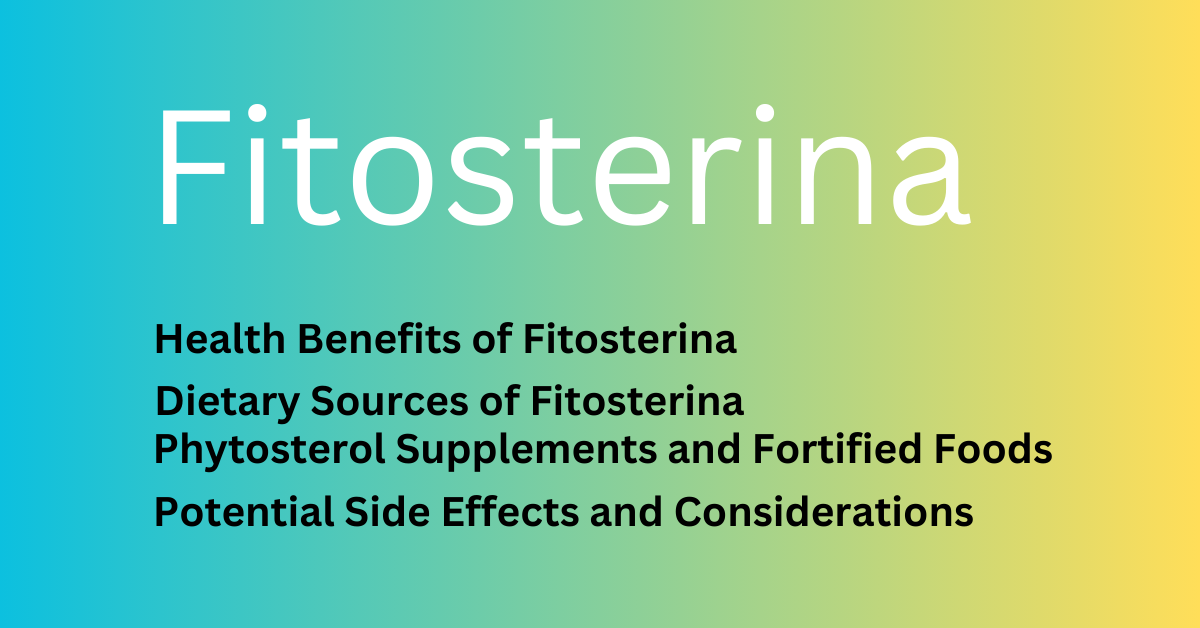Introduction
Fitosterina, commonly known as phytosterols, are plant-derived compounds with a structure similar to cholesterol. These compounds play a crucial role in promoting cardiovascular health and supporting overall well-being. In this article, we will explore the various aspects of fitosterina, including its definition, health benefits, sources, and more. With eight detailed sections, our goal is to provide a comprehensive and easy-to-understand overview of fitosterina and its significance in modern health practices.
1. What Are Fitosterina (Phytosterols)?
Fitosterina, or phytosterols, are naturally occurring compounds found in plants. They are structurally similar to cholesterol, which allows them to compete with cholesterol for absorption in the digestive tract. This competitive inhibition helps reduce the amount of cholesterol that enters the bloodstream, contributing to cardiovascular health. Fitosterina are commonly found in various plant-based foods and are often included in dietary supplements and fortified products.
2. The Chemical Structure of Fitosterina
Phytosterols have a chemical structure similar to cholesterol, but with subtle differences. These differences affect their ability to interact with cholesterol and other lipids in the body. The primary phytosterols include beta-sitosterol, campesterol, and stigmasterol. Understanding their chemical structure helps explain their function in the body and their role in lowering cholesterol levels.
3. Health Benefits of Fitosterina
The primary health benefit of fitosterina is their ability to lower LDL (low-density lipoprotein) cholesterol levels, commonly known as “bad” cholesterol. By competing with cholesterol for absorption in the intestines, fitosterina reduce the amount of cholesterol that enters the bloodstream. This can reduce the risk of heart disease and stroke. Additionally, some studies suggest that phytosterols may have anti-inflammatory and antioxidant properties, further supporting cardiovascular health.
4. Dietary Sources of Fitosterina
Fitosterina are found in various plant-based foods, with some of the richest sources including nuts, seeds, vegetable oils, and whole grains. For example, sunflower seeds, almonds, and corn oil are known for their high phytosterol content. Fruits and vegetables also contain smaller amounts of phytosterols. Incorporating these foods into your diet can help increase your intake of fitosterina and support your cardiovascular health.
5. Phytosterol Supplements and Fortified Foods
In addition to natural dietary sources, fitosterina can be consumed through supplements and fortified foods. Many products, such as margarine, orange juice, and yogurt, are fortified with phytosterols to enhance their cholesterol-lowering effects. Phytosterol supplements are also available in various forms, including capsules and tablets. It’s crucial to select high-quality supplements and seek advice from a healthcare professional before beginning any new supplement routine.
6. Recommended Daily Intake of Fitosterina
There is no official recommended daily intake for fitosterina, but studies suggest that consuming about 2 grams per day can be effective in lowering cholesterol levels. This amount can be achieved through a combination of dietary sources and fortified foods. It’s essential to balance phytosterol intake with other aspects of a heart-healthy diet, such as reducing saturated fat and increasing fiber intake.
7. Potential Side Effects and Considerations
Fitosterina are generally considered safe for most people when consumed in moderate amounts through food and supplements. However, excessive intake of phytosterols may interfere with the absorption of fat-soluble vitamins, such as vitamins A, D, E, and K. Additionally, individuals with certain health conditions or those taking specific medications should consult with a healthcare provider before significantly increasing their phytosterol intake.
Conclusion
Fitosterina, or phytosterols, play a vital role in promoting cardiovascular health and supporting overall well-being. By understanding their function, dietary sources, and potential benefits, individuals can make informed choices to incorporate these beneficial compounds into their diet. Whether through natural foods or fortified products, fitosterina offer a valuable tool for managing cholesterol levels and enhancing heart health. As research continues to evolve, the future of phytosterols holds promising possibilities for improving health and preventing disease.




